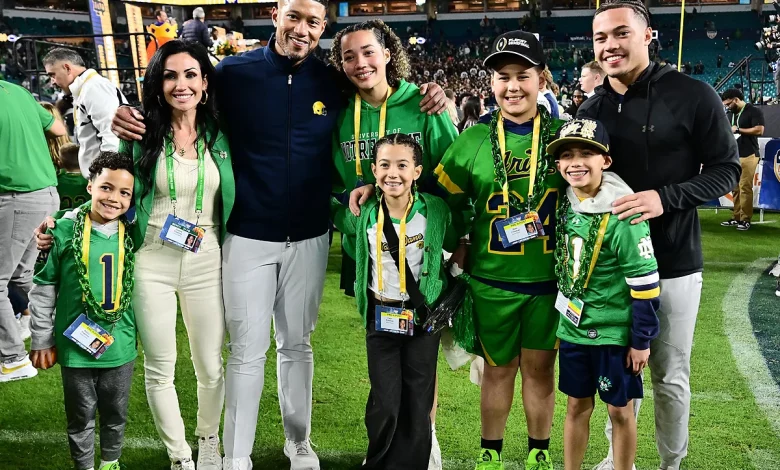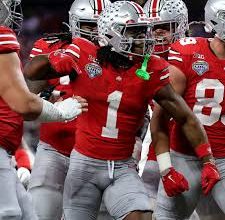Notre Dame football coach Marcus Freeman says he’s an assistant coach at home

Notre Dame head football coach Marcus Freeman may be the leader of one of the most storied programs in college football, but when he walks through the door of his South Bend home, he sheds the title of “head coach” and proudly embraces the role of “assistant coach.” In a recent interview, Freeman lightheartedly and humbly remarked, “I’m the assistant coach at home,” a statement that offers a window into the man behind the headset — a devoted husband, an engaged father, and a figure who values leadership not just on the field, but in his family.
This candid comment resonates far beyond the gridiron, offering a profound reflection on the duality of leadership in professional and personal life. For Freeman, who is known for his intense focus, accountability, and discipline as a football coach, his acknowledgment of his role at home provides an important message about humility, balance, and the prioritization of family in high-pressure careers.
A Demanding Role at Notre Dame
As head coach of Notre Dame, Marcus Freeman holds one of the most prestigious and scrutinized positions in college football. The Fighting Irish are steeped in tradition, with national titles, Heisman winners, and a global fanbase expecting annual excellence. Freeman assumed the role in December 2021, quickly gaining admiration for his energy, honesty, and connection with players.
Under his leadership, Notre Dame has continued to build its identity — tough, disciplined, and united. Recruiting top-tier athletes, managing a high-profile staff, navigating a grueling schedule, and constantly appearing in the media spotlight are all parts of his day-to-day job. It’s a role that demands maximum intensity and time commitment.
Yet, even amidst these pressures, Freeman makes it a priority to remain deeply connected to his family.
Life Off the Field: The Freeman Family
Marcus Freeman is the father of six children, a role he often cites as his most important and rewarding. His wife, Joanna, is the central figure of the household, whom Freeman refers to as the “head coach” at home — hence his quip about being the assistant.
“When I get home, I’m not Coach Freeman. I’m dad. I’m husband. I’m trying to get the kids where they need to go, help out wherever I can,” Freeman shared in an interview. “I might lead 100 guys on a football field, but at home, I’m part of a team — and my wife is the head coach.”
This metaphor is more than a joke — it reflects the deep respect he has for the role his wife plays in managing the household and ensuring that their family operates smoothly. Joanna, who often stays out of the public spotlight, manages the chaotic schedules of six children, ranging in age from toddlers to teens. From school drop-offs and sports practices to family meals and homework routines, her leadership ensures that the Freeman home is one of structure, love, and stability.
The Challenge of Balance
Balancing a career in high-level athletics with a thriving family life is no easy feat. Coaches are known for grueling schedules — film study, early-morning workouts, weekend games, constant recruiting trips, and year-round planning. The demands can easily consume a person’s time and energy, leaving little left for home life.
Freeman, however, makes intentional efforts to be present for his family, both physically and emotionally. He’s spoken openly about the importance of attending his children’s activities — whether it’s watching a youth soccer game or simply being there for bedtime.
“It’s hard. You have to be intentional,” Freeman said. “If I don’t plan for my family the way I plan for football, I’ll fail them. And I refuse to do that.”
His approach challenges the old-school narrative of the “football coach who lives at the office.” Freeman is part of a new generation of leaders who believe success at work shouldn’t come at the expense of personal relationships and who understand that being a great father and husband is equally important.
Teaching Values at Home and On the Field
The Freeman household runs on values not dissimilar to those that drive Notre Dame’s football team: respect, accountability, discipline, love, and trust. Whether coaching athletes or parenting children, Freeman emphasizes character.
“Every lesson I teach my players — about work ethic, attitude, integrity — those are the same things I’m trying to instill in my kids,” he explained. “The audience is different, but the mission is the same.”
As the “assistant coach” at home, Freeman sees himself as a support system — not just to Joanna, but to his children. He helps guide them through life’s challenges, celebrates their successes, and uses mistakes as teaching moments. That same philosophy is evident in his coaching style: he doesn’t just yell from the sideline, he coaches with empathy and purpose.
The Power of Vulnerability
Freeman’s acknowledgment of his wife’s leadership at home isn’t just refreshing — it’s an act of vulnerability, a trait not often associated with football coaches. In a culture that sometimes celebrates control and stoicism, Freeman’s transparency about his home life adds a layer of relatability and humility.
Rather than asserting dominance in every area of life, he models partnership. By publicly recognizing that his wife runs the home and that he’s part of the support team, he shifts away from traditional gender dynamics and embraces a more modern, equitable view of family life.
This mindset influences his players too. Many student-athletes at Notre Dame come from diverse family backgrounds, and seeing their coach model respect, shared responsibility, and emotional intelligence helps shape how they view their own relationships, both now and in the future.
Faith, Family, and Football
At Notre Dame, where faith plays a central role in the university’s identity, Freeman’s prioritization of family fits seamlessly into the larger culture. He often speaks about faith guiding his decisions and being a stabilizing force amid the pressures of life.
For Freeman, the order is clear: faith first, then family, then football.
“I remind myself every day: I’m a man of faith, a husband, a father, and a coach — in that order,” he said. “If I ever get that backwards, I’m in trouble.”
That mindset anchors him, even when the spotlight burns brightest. Whether after a big win or a tough loss, Freeman remains grounded in his purpose, knowing that the scoreboard doesn’t define his worth as a man.
Impact Beyond the Home
Freeman’s example has extended beyond his own family and team. His approach to leadership has sparked conversations about work-life balance, emotional intelligence in coaching, and the role of family in professional success.
Young coaches look up to him not just for his football acumen, but for the way he lives his values. His authenticity, both in the locker room and at home, has made him one of the most respected figures in college sports.
Parents, too, see in Freeman a reminder that it’s possible — though not easy — to excel professionally without sacrificing your presence at home. His willingness to admit that he’s not the “head coach” everywhere sets a precedent for others in leadership roles to do the same.
Looking Ahead
As Marcus Freeman continues to lead Notre Dame through intense football seasons and high-stakes games, he remains committed to being the assistant coach at home — driving the kids to practice, showing up for school plays, and being present for the moments that matter.
He’s building more than a football program. He’s building a legacy of balanced leadership, one that honors both ambition and humility, public success and private faithfulness.
Marcus Freeman’s simple statement — “I’m the assistant coach at home” — reveals a depth of character that extends far beyond the football field. It’s a philosophy grounded in humility, love, and partnership, reflecting his respect for his wife’s leadership and his commitment to his children.
In a high-pressure world that often demands everything from its leaders, Freeman shows that it’s not only possible but essential to lead at work and serve at home. And perhaps that’s the true mark of greatness — not just what happens between the goalposts, but what happens at the dinner table.









